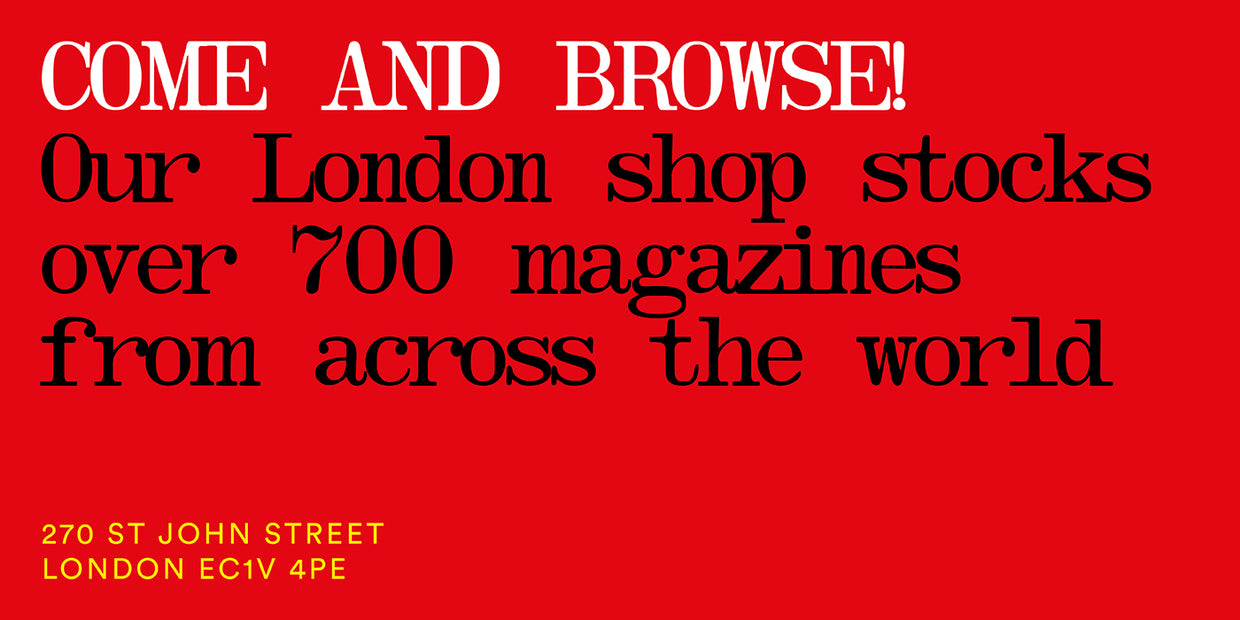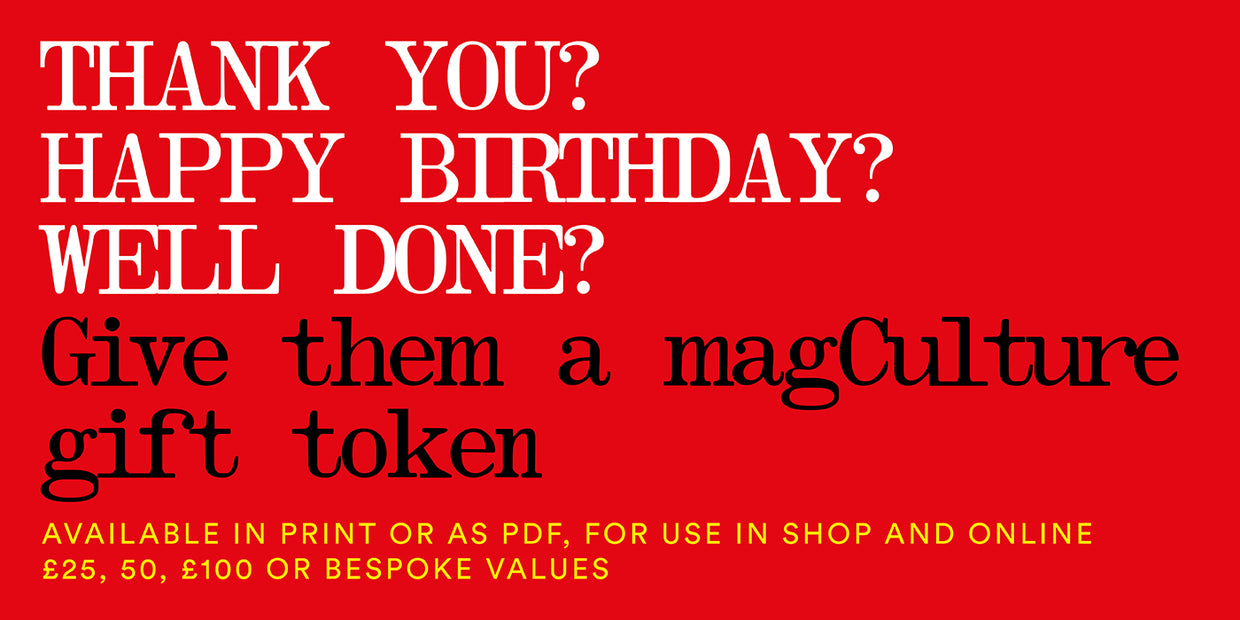
Interview with Rosa and Rich, Cereal

A lonely mountain peak juts out of a snowy wilderness. The hard line of its ancient ridge provides the only point of perspective in an otherwise white plain. This view of the Kluane National Park in Yukon sits on the cover of Cereal magazine’s latest issue, and for me encapsulates the visual language and central tenets of the editorial. At a time when the field of minimal photography and design is arguably saturated, Cereal presents a unique aesthetic. Simple, understated; yet deeply engaging, a Cereal image, whether it is seen on the magazine’s staggeringly popular Instagram feed or as part of a thirty page photo essay is instantly recognisable.
Interview & photography by Robbie Lawrence, jointly published with Freunden von Freunden.

After two years on the shelves of independent bookshops, galleries and boutique hotel lobbies, Cereal has cemented itself among the elite cannon of high quality independent magazines that have revitalised the global publishing scene. From the moment founders Rosa Park and Rich Stapleton launched their magazine in December 2012, taping up boxes of magazines themselves on Rosa’s apartment floor, it has enjoyed exponential success; both in terms of production growth and its expansion into a lifestyle brand.

The visual minimalism of the magazine belies the monumental work ethic of its creators. Each issue is painstakingly planned and researched. With a background in engineering, Rich’s approach to laying out Cereal bridges an almost scientific methodology with a voracious fascination with design. In the lead up to the release of a new volume, he can be found at the coalface of InDesign and Photoshop, painstakingly pouring over hundreds of cover options which fractionally vary in tone, a process that Rosa finds amusing and exasperating. In contrast to his systematic work process, she charges through each day, scribbling over feature edits, discussing future articles with photographers and writers, meeting brand collaborators, firing emails to all ends of the globe, all the while ripping her New York accent through the quiet streets of Bath where they have recently found a new apartment.

I visited the pair on a brisk morning late last year as searing November light poured over the city. On such mornings, it is little wonder that Rosa, despite her itinerant approach to life, has chosen to make this small town in the south west of England her home. As I made my way to their new home, I marvelled at the honeycombs of Palladian adornment that curl around the facades of the Circus and Royal Crescent. Sitting over toast and black coffee, I spent the morning chatting to them about their perspective on modern travel, where they seek inspiration and their upcoming new project, a literary journal.
You both travelled a lot as kids and as teenagers, could you give me a quick rundown of where you lived and how these experiences affected you?
Rosa: I was born in Seoul, Korea, then immigrated to Vancouver when I was eight, but ended up going back and forth between the two cities whilst growing up. For university, I moved to Boston and, after graduation, I relocated to New York where I got my second degree and worked in fashion and beauty marketing for about five years. Finally, I ended up here in England for my Master’s degree and have happily resided here since! Having moved around so much, I don’t necessarily have a physical sense of home and often feel most at ease when I’m on the road. I’m quite taken with the idea of moving to a new city every five years, but perhaps that’s not a realistic lifestyle after a certain point in time when you have to begin thinking about settling down.
Rich: As a family, we moved every two to three years – and as a result I lived in various places in England, Scotland, Germany, Belgium, and Italy. I went to university in Bath, travelled for a few years and I have now returned here. More than anything, I’m now learning to find comfort in familiarity and appreciate what surrounds me. I think this reflective perspective, gained through travel, has helped shape the way in which I explore new travel destinations.
To what extent did these experiences push you towards publishing a travel magazine?
Rosa: Travel is an intrinsic part of my life; if habits inform your character, then I am a traveller through and through. As such, it’s one of the topics that I feel most comfortable discussing. I can talk about various destinations and forms of voyage until the cows come home. As such, it makes absolute sense for me to start a travel magazine where I get to share my way of travelling with a readership. I didn’t realise this growing up, but once I knew I wanted to start a magazine, starting a travel one made complete sense.
Rich: I almost always travel with a camera in hand, with the desire to capture the look and feel of a city or the beauty of a natural landscape as an image. This desire to visually record what I encounter is an aspect of personal travel that has extended into what we do with Cereal. Print is a very emotional medium, and it allows experience of a particular place to be translated very effectively.

What perspective on travel are you trying to give?
Rosa: With Cereal, I am trying to bring a younger, more modern approach to travel. I say younger because the way I travel is quite different from say, my parent’s generation. I seek out places that I believe my peers would want to visit and experience, which means a combination of great service, quality, elevated aesthetic sensibilities, and affordability. If it’s a city break, then I want to stay at a lovely boutique hotel in the up and coming neighbourhood, hang out at beautifully designed, laid back cafes, and shop at well-curated lifestyle shops – places that the locals would patron. If I’m searching for something a bit more far-flung and exotic, then I am going to make sure I am in for the kind of visual drama that you have to travel days and sometimes weeks to reach. It’s all about having an experience that feels unique to you and isn’t simply ticking off an item off your bucket list, like the pyramids of Giza or the great wall of china, or staying in the centre of town doing your typical touristy stuff.
What do you think people find appealing about this perspective?
Rosa: I think it attracts our readers because it can be daunting and sometimes challenging to find this kind of information online or through your usual roster of guide books. We do the hard work for you: we visit the places, we research and test out the venues, then we bring you a carefully edited selection of what we believe is the best. People these days always want to have a ‘special’ experience that seemingly deviates from the mainstream, and I think we provide that.
What makes a great Cereal photo series?
Rosa: Hmm... when it comes to travel photography, we consistently try to imprint our visual identity on to the scenery no matter where we visit. So we will find the clean, minimalism in every destination! For me, a great Cereal photo series is one that you can instantly tell is produced by us without even having to check. Then we’ve done our job.

Rich: Exactly. Wherever we travel to, we are always looking at the landscape through a Cereal lens. Our series tend to employ a wide, expansive style of photography, with plenty of negative space. They are a combination of photos that work well together, not just as individual images. It is important that this visual identity is a current that runs through the core of every series we produce.
While Cereal’s aesthetic and design often seem to generate the most attention, it seems that the quality of writing forms the backbone of the editorial, would you agree?
Rosa: I would have to agree, but then again, I’m biased. I’m the editor after all! The visuals attract most of the attention, but for me, the magazine would be nothing without the writing. We go to great lengths to ensure that our writing standard is as high, if not higher, than the standard of our photography. Every article is intensely researched and fact-checked, and I think our writers are just amazing.
You mentioned that you were considering publishing a magazine that features only written work, tell me about this.
Rosa: Yes! We are currently working on a literary journal which we are looking to launch in 2015. It’ll begin as an annual, and I’ll see what the response is like and go from there. I suppose it’s in some way a reaction to how visual Cereal is. At the end of the day, words are my life and I’ve long wanted to start a project that placed the written word at centre stage. This will do exactly that, and it’ll also be a chance to go crazy with fonts and calligraphy!
Are you glad you chose to start a magazine?
Rosa: The answer depends on which day you ask me that question (laughs). Today, my answer would have to be yes. Running your own independent magazine is gruelling and it definitely pushes you to your limits, but what you accomplish makes it worthwhile.
Rich: I find the experience rewarding and exhausting in equal measure. All in all, for me, there’s nothing quite like the feeling of holding a freshly printed volume of Cereal in my hand, the result of months of hard work.
Where do you look for inspiration?
Rosa: I mostly look to travel, books and art for inspiration. I guess most people in the industry do. Sometimes I delve into my past for inspiration; I do that because I am constantly trying to figure out what’s truly me and in order for me to do that, I look into my history and see what I’ve always loved and stayed loyal to.
Rich: My sources of inspiration are constantly in flux but tend to be very visually orientated. Recently I have been finding inspiration in the work of Agnes Martin, Sugimoto and Fred Sandback. I am also fascinated by architecture; there are simple foundations in architectural sketches that translate very well into photography and editorial design.

Despite travelling for most of the year, you have chosen to make Bath your home, why here of all places?
Rosa: Bath is the one place where I feel sane. I’m easily influenced by my surroundings and being in big cities can drive me a bit crazy after awhile. I know that from experience! Prior to Bath, I only lived in big cities and I felt that it stifled my creativity and slowed down my productivity. Bath allows to me to zero in on what’s important and gives me a kind of clarity that I can’t attain elsewhere. The beauty of this town also makes me swoon; I fall in love with Bath every single day.

Rich: I find Bath’s familiarity (it is the place I have lived the longest), combined with the city’s aesthetic heritage, thanks to wide-spread architectural use of Bath stone, has a somewhat calming effect on me. This sense of personal quiet allows me to concentrate on what’s important, the production of the magazine.

What are your favourite places in the area?
Rosa: I love browsing for books at Bath Old Books and Topping. For general lifestyle needs I always go to Found, and for breakfast and lunch, my go-to spot is Sam’s Kitchen. For coffee it’s Colonna and Small’s or Society Cafe. If I’m in need of flowers, Passion is the best. I love sitting out in Queen Square as well as the front lawn at the Royal Crescent.

I was discussing with a friend a few weeks ago, what the idea of ‘home’ means in the current day. This seems a particularly pertinent topic for you guys, because it’s my impression that despite travelling the whole time, you get a great amount of joy from being at home, and curating that environment.
Rosa: I think home is where you feel the most relaxed. And you’re likely to feel this way in a setting that you’ve taken the time to set up and curate to your liking and tastes. I have made sure that my home is a reflection of my preferences, and as such, there is nothing better than lazing around on a weekend morning with a cup of coffee and a pile of mags and books with some lovely background music. It’s such a simple pleasure, and it’s a welcome counter to the travelling I do. I think in life – at least in mine – you’re constantly seeking balance, and after all the travelling there’s a need for a place you can come back to and have as your base.
Interview & photography by Robbie Lawrence for Freunden von Freunden.



